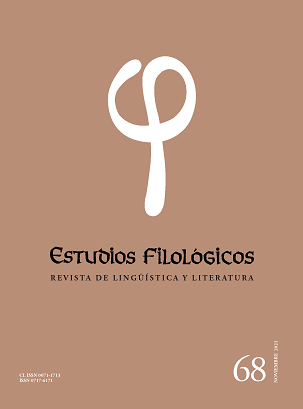Biography as Identikit: La luz negra, by María Gainza
Main Article Content
Abstract
This article aims to analize La luz negra, by María Gainza, placing special emphasis on how this novel experiments with the biography as a gender and questions several assumptions of the so-called “biographical illusion”. Based on various theoretical considerations on biographical writing, it argues that La luz negra’s biographical poetics dwells on the indefinite and imprecise, instead of the attachment to facts and truthfulness documentary that characterize the canonical biographical writing. The final assumption is that this novel suggests that the best biography is the one that is not written, the one that is interrupted before the search for information is thoroughly completed.
Article Details
How to Cite
Fontana, P. (2021). Biography as Identikit: La luz negra, by María Gainza. Estudios Filológicos, (68), 193–205. https://doi.org/10.4067/s0071-17132021000200193
Issue
Section
Dossier

